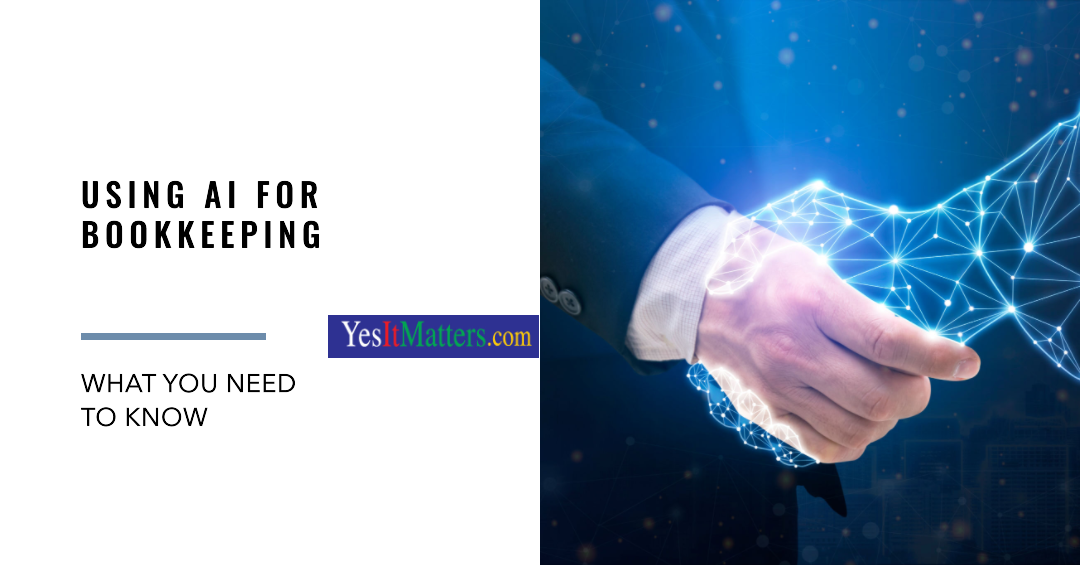Bookkeeping Assisted by AI: Impact on Businesses and Cost Benefits
In today’s rapidly evolving business landscape, technology plays a crucial role in streamlining various processes. One such area is bookkeeping, where artificial intelligence (AI) is revolutionising the way businesses handle their financial records. Bookkeeping assisted by AI offers several advantages, including increased efficiency, accuracy, and time savings. However, like any technology, it also has its drawbacks. In this article, we will explore the pros and cons of bookkeeping assisted by AI and its impact on businesses, particularly focusing on the cost benefits it brings.
Pros of Bookkeeping Assisted by AI:
- Enhanced Efficiency: AI-powered bookkeeping software automates repetitive and time-consuming tasks, such as data entry and reconciliation. This efficiency boost allows businesses to redirect their valuable resources to more strategic activities.
- Improved Accuracy: AI algorithms minimize human error, reducing the chances of manual mistakes in data entry and calculations. This accuracy leads to more reliable financial records, which are vital for decision-making and compliance purposes.
- Time Savings: By automating various bookkeeping tasks, AI frees up time for bookkeepers to focus on higher-value activities, such as financial analysis and strategic planning. This time-saving aspect can greatly benefit businesses by enabling faster decision-making and resource allocation.
- Real-Time Insights: AI-powered bookkeeping tools provide real-time visibility into a company’s financial health. Business owners and managers can access up-to-date financial data and generate insightful reports, empowering them to make informed decisions promptly.
- Scalability: AI-driven bookkeeping solutions can easily scale as a business grows. Whether the volume of transactions increases or new accounting requirements arise, AI systems can adapt and handle the expanding workload efficiently.
Cons of Bookkeeping Assisted by AI:
- Initial Setup and Learning Curve: Implementing AI-powered bookkeeping systems may require an initial investment of time and resources. Businesses need to adapt to the new software, train employees, and ensure a smooth transition from traditional bookkeeping methods.
- Dependency on Technology: While AI can enhance efficiency, businesses become reliant on technology functioning flawlessly. Technical issues, software updates, software abandonment, or system failures can disrupt bookkeeping operations if contingency plans and backup procedures are not in place.
- Limited Contextual Understanding: AI algorithms excel at processing structured data, but they may struggle with understanding contextual distinctions. Bookkeeping tasks involving subjective judgment or complex scenarios may still require human intervention or oversight.
- Security and Data Privacy Concerns: As businesses rely on AI systems to handle sensitive financial information, ensuring data security and privacy becomes paramount. Adequate safeguards must be in place to protect against data breaches and unauthorised access.
Cost Benefits of Bookkeeping Assisted by AI:
- Reduced Labour Costs: Automating repetitive bookkeeping tasks with AI technology minimises the need for manual labour, leading to potential cost savings on staffing expenses.
- Time Savings: As mentioned earlier, AI-driven bookkeeping saves time by automating tasks. This time can be reallocated to revenue-generating activities, which can positively impact a business’s bottom line.
- Fewer Errors and Reconciliation Efforts: AI-powered bookkeeping software reduces the occurrence of errors and discrepancies, eliminating the need for extensive manual reconciliation. This reduction can save businesses valuable time and resources.
- Scalable Pricing Models: Many AI bookkeeping solutions offer flexible pricing models, allowing businesses to choose options that align with their needs and budgets. This scalability ensures that businesses pay for the services they require without unnecessary overheads.
Bookkeeping assisted by AI offers numerous benefits to businesses, including increased efficiency, accuracy, time savings, and real-time insights. These advantages can significantly improve financial processes and decision-making. However, it is important to acknowledge that AI-powered bookkeeping may not be suitable for all businesses, especially smaller ones with limited resources. The initial setup and training requirements can be costly and time-consuming, making it a more viable option for larger enterprises with the necessary infrastructure. Additionally, some businesses may have unique complexities or specific industry requirements that AI may struggle to address without human intervention. It is crucial for businesses to assess their individual needs, resources, and objectives before deciding to implement AI-powered bookkeeping systems. By carefully considering the advantages, drawbacks, and their specific business context, businesses can make an informed decision on whether AI-powered bookkeeping aligns with their goals and capabilities. For those who can benefit from it, bookkeeping AI can streamline financial processes, provide valuable insights, and enhance overall financial health.





